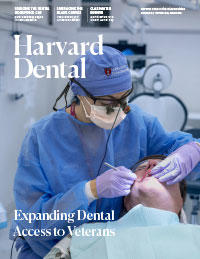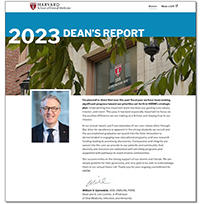
“As a healthcare provider, the number one call for help, and the most rewarding service that I have provided to patients, is palliative care,” said Dr. Leonard Brennan. Dr. Brennan, a faculty lecturer in Oral Health Policy and Epidemiology, and expert in geriatric dentistry, spoke with caregivers and health providers in a recent webinar, Supporting Family Caregivers to Provide Oral Palliative Care for Older Adults. He explained how the management of cancer and other serious illnesses may negatively impact the oral health of older adult patients, and how early palliative care interventions can limit severe complications from treatment.
“Looking at what needs to be done, strategizing, and identifying what type of dental care a patient needs prior to palliative care instead of in a decline into palliative care, ideally needs to be dealt with and managed before end-of-life care. This will help to improve the quality of life for older adults in palliative care,” said Brennan.

Most older adults enter palliative care with multiple uncontrolled dental problems. It is important that effective and evidence-informed guidance for health and care professionals exists, in order to ensure that oral health care is addressed appropriately. “We provide palliative care so that we can prevent a fire, not put one out,” Brennan said.
Oral health providers are often overlooked as a part of the palliative care team, but they are crucial to the overall care and comfort for patients. Dentists play an important role in controlling pain and treating infection, allowing patients to feel more comfortable at a time when it is most needed. Because critically ill patients may be totally dependent on others for assistance, dental providers can also assist family caregivers in understanding their role in oral hygiene and pain management in between visits.
To learn more about developing a caregiver toolkit for oral palliative care and special considerations for older palliative care patients, view the webinar recording.
This National Center for Equitable Care for Elders webinar was supported by the Health Resources and Services Administration (HRSA) of the U.S. Department of Health and Human Services (HHS) as part of an award totaling $1,723,158 with 0 percentage financed with non-governmental sources. The contents are those of the author(s) and do not necessarily represent the official views of, nor an endorsement, by HRSA, HHS, or the U.S. Government. For more information, please visit HRSA.gov.


